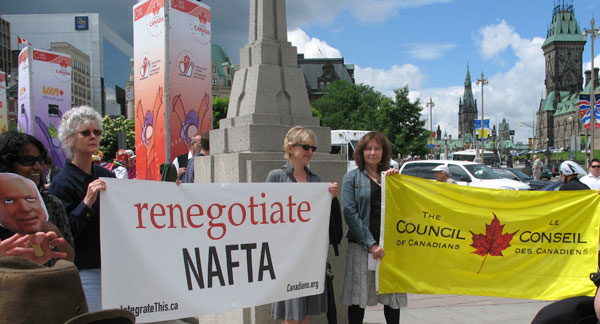Like this article? rabble is reader-supported journalism. Chip in to keep stories like these coming.
Billionaire T. Boone Pickens is suing Canada through the North American Free Trade Agreement (NAFTA) for $700 million in future lost profit.
The New York Times explains, “[In 2011] the province of Ontario granted [Florida-based] NextEra $3.8 billion in energy contracts. [Pickens and his Texas-based wind power company] Mesa Power contends that $18,600 in donations that NextEra made to the ruling Liberal Party in Ontario before elections in 2011 had undue influence on the auction. Mesa Power’s notice of arbitration also includes allegations of favoritism toward two Korean companies, Samsung C&T and Korea Electric Power Corp., that entered a separate energy deal with the [provincial] government.”
In terms of additional background, the newspaper notes, “When Ontario enacted a Green Energy Act in 2009, both Mesa Power and NextEra saw an opportunity. As part of its policy change, the government created a program to provide incentives for companies to invest in renewable energy projects. Companies that were awarded contracts would be paid premium guaranteed prices set by the government.”
“Mesa Power submitted several project proposals through the program. But when the first rankings came out in late 2010, its executives disputed the assessments, arguing that Mesa Power’s projects should have been higher. Ontario government officials have countered that Mesa Power did not submit its applications properly. …Mesa Power later disputed an auction in the spring of 2011, complaining of a lack of transparency around the process of awarding contracts and insufficient time for public consultation. …The same month that the government rejected his projects in 2011, Pickens took his case to an international tribunal, a forum where the judges are appointed by both parties in the case and a judgment can’t be appealed.”
The Huffington Post adds, “The suit also claims the Ontario government imposed a variety of ‘prohibited’ buy-local rules, which the suit says violates NAFTA rules.” In December 2012 and May 2013, Ontario lost World Trade Organization (WTO) rulings that found that the “domestic content” requirements in the Green Energy Act discriminated against foreign-owned firms and were a violation of trade agreements. By December 2013, Ontario’s energy minister had announced the province would no longer require renewable energy developers to use local suppliers.
Both the Canada-European Union Comprehensive Economic and Trade Agreement (CETA) and the recently negotiated Trans-Pacific Partnership contain an investor-state dispute settlement (ISDS) similar in nature to the Chapter 11 ISDS provision in the North American Free Trade Agreement.
In January 2015, a study by the Canadian Centre for Policy Alternatives found that Canada is the most-sued country under NAFTA. Thirty-five claims have been made against Canada, while 22 were brought against Mexico and 20 against the United States. Canada has lost or settled six of those claims, Mexico has lost five cases, while the United States has won 11 and lost none. The Huffington Post notes, “About 63 per cent of the claims against Canada involved challenges to environmental protection or resource management programs that allegedly interfere with the profits of foreign investors.”
The NAFTA panel is expected to rule on Pickens’ claim this month.
For more on our trade campaign, please click here.
Like this article? rabble is reader-supported journalism. Chip in to keep stories like these coming.



